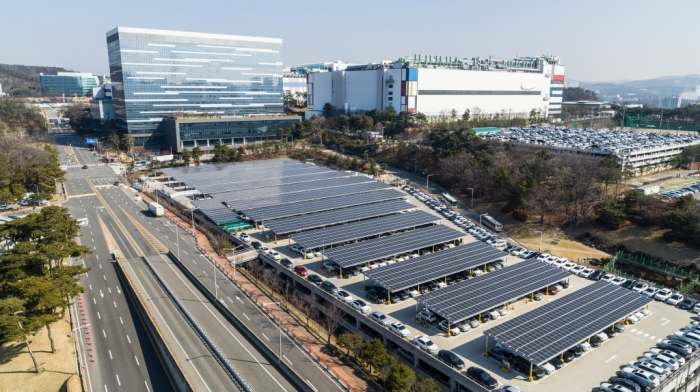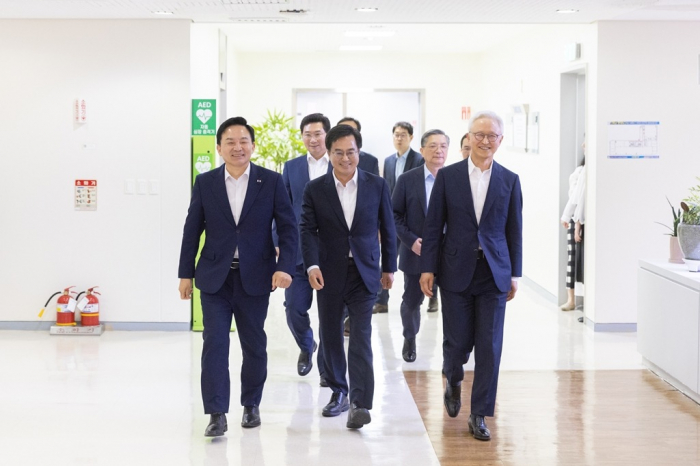Korean chipmakers
Samsung to invest $230 bn in Korea on speedy govt support
South KoreaŌĆÖs central and local governments vow to help Samsung secure enough electricity and water for the new chip lines
By Jun 27, 2023 (Gmt+09:00)
3
Min read
Most Read

Samsung Electronics Co., the worldŌĆÖs top memory chipmaker, is set to spend 300 trillion won ($230.4 billion) to build semiconductor manufacturing lines in South Korea as the country aims to boost the sectorŌĆÖs competitiveness by building a production complex two years earlier than planned.
The South Korean tech giant, the Ministry of Land, Infrastructure and Transport along with local governments on Tuesday agreed to accelerate the construction of a semiconductor cluster in Yongin where the company started its semiconductor business to complete the complex in five years, ahead of the initial schedule of seven years from 2023 to 2029.
Samsung plans to build five state-of-art semiconductor production lines by 2042 with the investment in the cluster of 7.1 million square meters. The tech giant also aims to establish a semiconductor ecosystem with some 150 contractors, fabless companies and research centers in the complex while integrating the new plants with its other local chip facilities.
ŌĆ£Timing is everything in the semiconductor industry,ŌĆØ said Samsung President & CEO Kyung Kye Hyun who oversees its global operations of the memory, system LSI and foundry business units.
ŌĆ£It is most important to start the construction of the Yongin National Industrial Complex early to maintain dominance amid intensifying global semiconductor competition,ŌĆØ Kyung said after Samsung and the authorities reached the agreement in the city, about 50 kilometers south of Seoul.
South Korea is a global semiconductor powerhouse as the country is home to the worldŌĆÖs two largest memory chipmakers ŌĆō Samsung and SK Hynix Inc.
MASSIVE POWER, WATER REQUIRED
Once the cluster is completed, Samsung is poised to start building a production line, which is expected to begin partial operations in 2030.
That is predicted to require 0.4 gigawatt (GW) of electricity and 30,000 tons of water a day to operate facilities and wash away semiconductor impurities 24 hours a day. The company is likely to need 7 GW of power and 650,000 tons of water when all five lines are in operation.
The ministry and local governments plan to help Samsung procure these resources as it is hard for the global tech behemoth to handle the needed infrastructure.
Gyeonggi Province, which includes Yongin, pledged active support as ŌĆ£one teamŌĆØ although the governor is from an opposition party.

ANY DELAY TO UNDERMINE COMPETITIVENESS
Companies have often faced challenges when central and local authorities have been uncooperative.
Samsung wasted five years in the mid-2010s when the company had conflicts with local residents over power cables for a new semiconductor plant in Peyongtaek, Gyeonggi Province, for example. Such a delay directly hurt its semiconductor competitiveness.
For the foundry business, the core sector of the new semiconductor cluster, it is important to supply as many products as necessary in a timely manner as ordered. Semiconductor companies build up plants based on industry forecasts for up to the next five years. Any delay in the construction of new plants is likely to result in a failure of deliveries of orders.
The central and municipal authorities vowed to help Samsung avoid such risks by accelerating the construction of the new semiconductor complex.
In addition, they discussed measures to expand transportation networks linked to the cluster and housing for workers.
Write to Jeong-Soo Hwang and Eun-Jung Kim at hjs@hankyung.com
┬Ā
Jongwoo Cheon edited this article.
More to Read
-
 Korean chipmakersIntelŌĆÖs foundry revamp sets off alarm bells for Samsung, TSMC
Korean chipmakersIntelŌĆÖs foundry revamp sets off alarm bells for Samsung, TSMCJun 22, 2023 (Gmt+09:00)
4 Min read -
 Korean chipmakersSamsung foundry backlogs top $74.6 bn for logic chip biz goal
Korean chipmakersSamsung foundry backlogs top $74.6 bn for logic chip biz goalApr 30, 2023 (Gmt+09:00)
3 Min read -
 Korean chipmakersSamsung Foundry: Driving force behind digital transformation
Korean chipmakersSamsung Foundry: Driving force behind digital transformationDec 01, 2022 (Gmt+09:00)
5 Min read -
 Korean chipmakersSamsung to invest $15 bn in semiconductor R&D complex
Korean chipmakersSamsung to invest $15 bn in semiconductor R&D complexAug 19, 2022 (Gmt+09:00)
5 Min read
Comment 0
LOG IN




